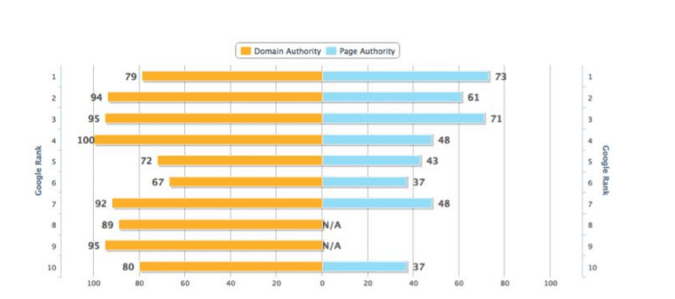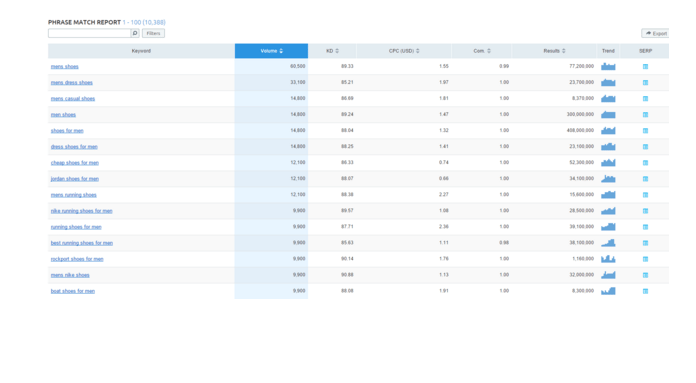
Anyone familiar with the SEO industry knows how crucial targeting the right keywords is. I would argue that keyword research is one of the most universally important parts to any SEO campaign. According to Moz, “Keyword research is one of the most important, valuable, and high return activities in the search marketing field. Ranking for the right keywords can make or break your website.”
This begs the question – How does one choose good keywords? Keyword research can be a difficult process, but fortunately there are several tools specifically created to make this process easier and more effective such as Moz, SEMrush, Google AdWords, Keywordtool.io, and more.
All too often, people view finding a good keyword solely as identifying a search term that has a good amount of monthly searches. For those who take it a step further, they take into consideration how many results google has for that search term as a way to feel out how many web pages are trying to rank for that keyword. This process is infinitely better than looking at search traffic alone, but it fails fundamentally in the fact that it doesn’t identify what kind of web pages are ranking.
This is where something called Keyword Difficulty comes into play.
WHAT IS THIS KEYWORD DIFFICULTY?
Honestly, you can probably guess. But just in case, here’s a definition: It’s a more accurate measure of how competitive a keyword is. There may be great monthly traffic for that keyword and only a handful of websites trying to rank for it. But what if the sites ranking for it are Amazon, Target, eBay, Cabela’s, Bass Pro Shops, etc.?
If you take into consideration the keyword difficulty, then you would realize that the top results are fairly heavy-hitters. Although it may have appeared to be a good keyword to target initially, the keyword difficulty score can save you a lot of wasted effort in trying to outrank a heavy-hitting competitor.
HOW IS KEYWORD DIFFICULTY CALCULATED?
Different tools have different ways of calculating keyword difficulty. In most cases, they take the top results for a keyword and average the page or domain authority to give the score for the keyword difficulty. Some include more in their algorithm, but as a general, bare bones explanation, the average domain authority is the root of almost every keyword difficulty tool.
The Moz Keyword Difficulty and SERP Analysis tool retrieves the top 10 rankings for any keyword, then assigns that keyword a Difficulty Score based on the pages that currently rank for that word.
 The SEMrush team has described their keyword difficulty this way – “What do we take into consideration to calculate keyword difficulty? We take the list of domains that are ranking in Google or Bing top 20 organic search results for the given keyword. Based on each website’s SEMrush Rank, we calculate their domain strength, and define the average number range, from 1 to 100%. The higher the percentage, the more effort you’ll need to outrank your competition for targeted keywords.”
The SEMrush team has described their keyword difficulty this way – “What do we take into consideration to calculate keyword difficulty? We take the list of domains that are ranking in Google or Bing top 20 organic search results for the given keyword. Based on each website’s SEMrush Rank, we calculate their domain strength, and define the average number range, from 1 to 100%. The higher the percentage, the more effort you’ll need to outrank your competition for targeted keywords.”
SEMrush recently updated the data provided in their organic research section for keywords to include keyword difficulty or “KD” as it shows up right after the search volume in the list results. Their keyword difficulty tool has been available since 2014, but was just recently added to display in the data for the organic results in February.

There are several other tools out there, as well as some blogs with instructions on how to build your own difficulty tool with excel. Follow your heart, or do research on what one fits your needs the best.
Keyword difficulty isn’t something new, but it’s something that is largely under-utilized in the keyword research process. To get a leg up on your competition, you should definitely take into consideration the keyword difficulty, whether you use Moz, SEMrush, a homemade program, or another online program.
If you’re at a loss for what to do with those keywords one you’ve got them, you’ll want to learn some basic SEO practices for blogging. It’s one thing to have great keywords identified, but the benefits come from what you do with those keywords.
In summary
Be a smart with SEO. If you put in the effort to choose good keywords at the beginning of your campaign, that time and effort will more than pay for itself as you see results. A keyword difficulty tool can greatly improve your keyword research and effectiveness in ranking.
Do you have any more keyword research tips or questions? Let us know in the comments below!
Much success,
Looking for more great reads? Check out these related articles:



